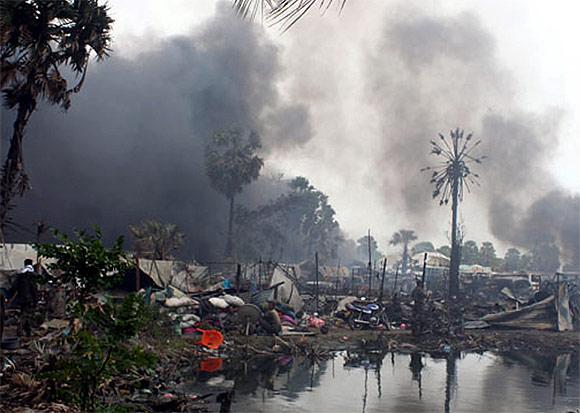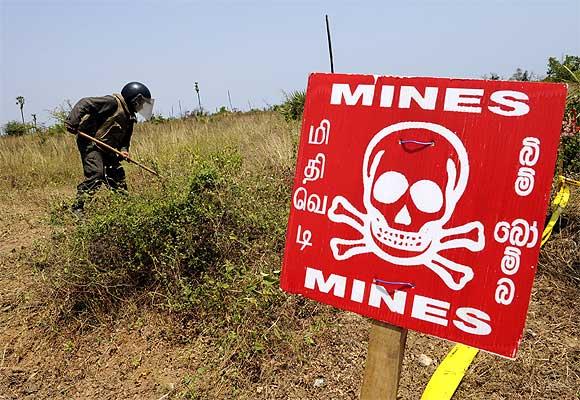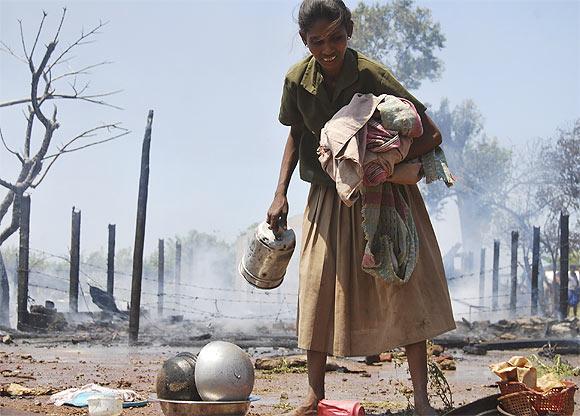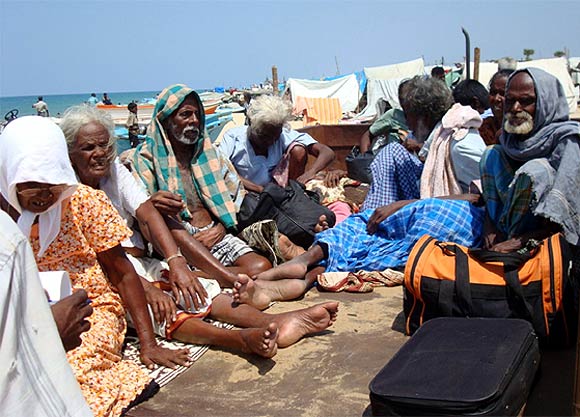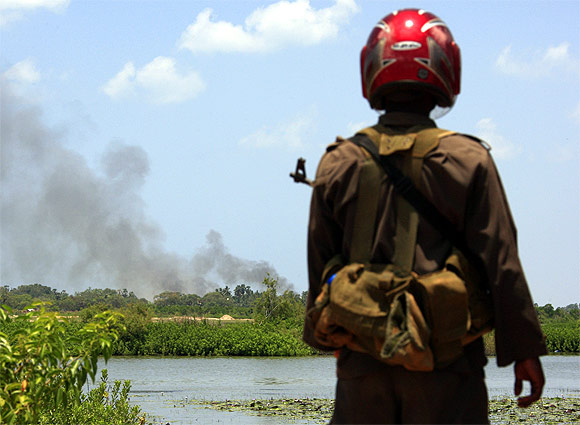 | « Back to article | Print this article |
'Death toll in LTTE war HIGHER than Srebrenica, Syria'
The war against the LTTE, waged by the Mahinda Rajapakse government, may have restored peace in Sri Lanka. But thousands of Tamils paid the price for the so-called victory with their lives, journalist Frances Harrison tells Vicky Nanjappa.
The annihilating battle against the Liberation Tigers of Tamil Eelam, waged by the Mahinda Rajapakse government, may have ultimately restored peace in Sri Lanka. But thousands of Tamils have paid the price for this so-called victory with their lives, journalist Frances Harrison reports in her new book Still Counting the Dead.
'Caught in the crossfire were hundreds of thousands of schoolchildren, doctors, farmers, fishermen, nuns and other civilians. And the government ensured through a strict media blackout that the world was unaware of their suffering,' Harrison states in her book.
Harrison, a veteran BBC correspondent who has reported from South Asia, South East Asia and Iran, was the resident BBC correspondent in Sri Lanka between 2000 and 2004.
She has worked at Amnesty International as Head of News and while writing this book, served as a visiting research fellow at Oxford University.
Frances Harrison spoke to Rediff.com's Vicky Nanjappa in an exclusive interview.
How has your book been received?
There has been criticism from parties on both sides of the war, but many ordinary Tamils around the world who have read it have thanked me for telling these stories.
At the book launch in London, a burly Tamil man rushed up to me. He had tears in his eyes. He gave me a huge hug, said 'Thank you' and walked off crying.
Please click NEXT for more...
'The Sri Lankan military stands accused'
There was an attempt made to make the Tamil Tigers surrender in 2009. Why do you think that failed?
There was a Norwegian initiative, which I write about in the book, to broker a laying down of arms in early 2009. It involved offering an internationally monitored amnesty to all LTTE cadres -- except (LTTE chief Vellupillai) Prabhakaran and (senior LTTE leader)Pottu Aman -- who would have had internationally supervised custody, according to the plan.
Obviously, the international community's leverage over the Sri Lankan government was stronger in January 2009 than in April/May 2009, when the army had all but won.
It was not a done deal by any means, but there was international backing for it.
My understanding is that the Tigers abruptly pulled out of the negotiations, opting instead for martyrdom.
In my opinion, this was a mistake because a negotiated surrender in good time might have saved thousands of civilian lives and prevented the abuse at the end of the war.
The LTTE's insistence on fighting on to the bitter end, amidst hundreds of thousands of civilians, does not in any way exonerate the Sri Lankan military of its responsibility for what ensued.
The moral equation is very complex and inter-dependent.
Do you think the Sri Lankan military went overboard while fighting the Tamil Tigers? Were such tough measures needed?
The Sri Lankan military stands accused -- in the report by the United Nations Panel of Experts -- of committing alleged war crimes and crimes against humanity and challenging the entire regime of international law on war. That's more than going overboard.
Crushing the Tigers unfortunately involved crushing civilians too, which is not acceptable. Now that the Tigers have been eradicated, the Sri Lankan government seems to think the 'terrorist problem' is finished.
This singularly fails to address the root causes of the long-running conflict, which are still simmering.
Please click NEXT for more...
'India was not looking too closely'
What role could India have played in preventing such war crimes?
There is little doubt that India has huge political influence and interests in Sri Lanka. Politicians in India were talking about a post-war power sharing deal for Tamils at a time when innocent civilians were being killed in the thousands.
That sent a message that India was not looking too closely at what was going on in the war zone -- rather it was focused on Lanka's future after the LTTE. That seems to me to be turning a bit of a blind eye to the killings.
But India is definitely not alone in doing that -- many Western countries did the same.
My hope is India will now put more pressure on Sri Lanka to improve the lives of minority Tamils and deliver justice.
Is Sri Lanka doing enough to rehabilitate the survivors?
Most people in southern Sri Lanka deny that there were any war crimes committed by their army in 2009. On the other hand, many Tamils deny the abuse by the LTTE of their own people -- such as forced recruitment of teenagers even when defeat was certain.
I think it has become very emotional and difficult to disentangle fact from feeling. I worry that Tamils and Sinhalese have such different narratives of the conflict that they can't find any common ground any more.
As far as rehabilitation goes, thousands of survivors of the last war have escaped via southern India and South East Asia. Some make it to Europe, America or Australia, but many get stuck. They have no official rehabilitation programme abroad and badly need all sorts of help which they do not get.
In terms of people in the country, I am concerned about reports that religious services commemorating the dead cannot be held openly and that even trauma counselling has been at times discouraged.
People who went through Mullivaikkal (external link) are destroyed, smashed, broken individuals who can't sleep at night and feel guilty that they survived when so many others didn't. They need psychological help as well as security, jobs and houses.
Please click NEXT for more...
'The Mullivaikkal incident is probably one of the bloodiest conflicts this century'
Do you think the UN inquiry into the war crimes will yield any results?
If you mean the UN panel report published in 2011, well, it is an excellent document of record and it has helped. It led to the UN Human Rights Council vote last March. But do I think enough is being done generally -- obviously not.
There needs to be more pressure on Sri Lanka. What happened in Mullivaikkal is probably one of the bloodiest conflicts in this century and yet those who are responsible have gotten away with it.
Worse still, few even know or care.
What was the exact death toll, according to you?
Nobody has an exact death toll. That is the shocking thing in this day and age of satellite images, social media and forensic science. We can't round up the number of dead human beings even to the nearest 10,000!
At my book launch in London on Friday, one of the UN panel authors -- Yasmin Sooka -- said the number of dead in Sri Lanka in 2009 could possibly reach 75,000.
The UN panel report cited 40,000 as a credible figure. The Bishop of Mannar has asked where those 147,000 people are who appear to be missing in the government's own statistics.
So there are huge differences in the figures used. It is certainly tens of thousands -- definitely more than better-known events such as the massacre in Srebrenica (during the 1995 war in Bosnia) and the ongoing war in Syria.
Please click NEXT for more...
'Can you imagine what the next generation of children will think?'
Has this issue received enough global attention?
What role can the international community play to ensure justice?
It is a forgotten issue internationally. Only Tamils protest in Europe -- hardly anyone else is that bothered. The Tamil Diaspora has failed to build a wider solidarity movement.
The international community should look into what happened. I would say read the UN panel's report, read my book, watch the Channel 4 film Killing Fields as well as read the Sri Lankan government's report of the war (Lessons Learnt and Reconciliation Commission's report) and make up your own mind.
Personally, I agree with the UN panel's call for an independent international investigation. That is the only way to establish the truth and build a future.
There have been widespread protests in Tamil Nadu against the Rajapakse regime. They have called for a trade blackout with Sri Lanka. Do you think such a measure would help?
I am a journalist, not a politician. This is a policy question for a politician.
Is there a chance of the Tamil cause rising again in Sri Lanka?
Yes, but not immediately. None of the Tigers I interviewed for my book want to fight again now. I doubt if any of those individuals will resume armed struggle.
But if Sri Lanka does nothing to address the Tamil community's grievances -- which is unfortunately the case now -- then this problem may arise again in another generation and probably more brutally, if that's conceivable.
Remember that Prabhakaran was inspired to take up arms after hearing about the anti-Tamil riots as a child.
Can you imagine what the next generation of children will think if they hear these stories from Mullivaikkal? The cycle of revenge and violence needs to halt, but tragically I do not see that happening.
Can there be reconciliation between the Tamil and the Sinhalese communities if both move away from their rigid stands?
There can be no reconciliation without a degree of truth first. There has to be an honest acknowledgement on all sides of any wrongdoing.
What is happening now is the exact opposite -- more polarisation than ever.
Please click NEXT to see more features...
TOP photo features of the week
Click on MORE to see another set of PHOTO features...
